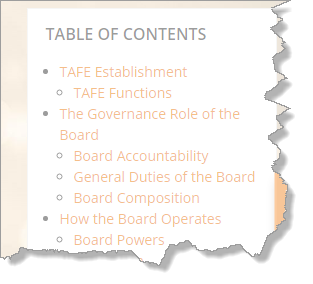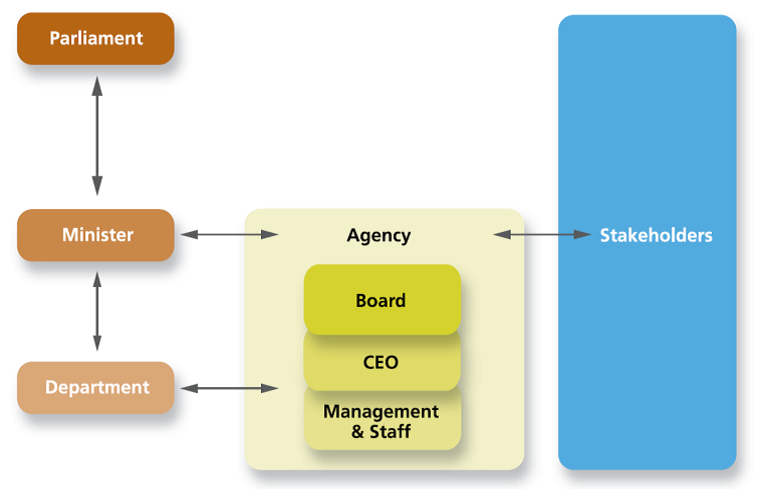Staff on TAFE Boards
| Site: | My new Moodle site |
| Course: | Module 6: Staff on TAFE boards |
| Book: | Staff on TAFE Boards |
| Printed by: | Guest user |
| Date: | Friday, 3 May 2024, 7:43 PM |
About this Module
Objective
This module is designed to provide information to prospective staff members that complements internal information processes. The intent would be to provide an overview that can be adopted by each TAFE Institute.
How to move around this module
 Use the Table of Contents at the top right of each screen to navigate to different sections of the Module.
Use the Table of Contents at the top right of each screen to navigate to different sections of the Module.
Many screens contain links in orange text that will take you out of this site to additional third party information.
How to move between screens
 Use the left and right arrows located at the top and bottom of each screen to move back or forward one screen.
Use the left and right arrows located at the top and bottom of each screen to move back or forward one screen.
You can also move directly to a specific screen by clicking on it's title in the Table of Contents at the top right hand side all screens.
Printing
 You can print the whole module or individual screens or "chapters" by clicking on the small cog at the top of each screen and choosing either:
You can print the whole module or individual screens or "chapters" by clicking on the small cog at the top of each screen and choosing either:
Print Book
(whole Module)
Print this Chapter
(Current Screen)
A new smaller window will open with the content. Look for the "Print this Book" link at the top of this window to print or save to a PDF file.

TAFE Establishment
Victoria has twelve TAFE Institutes which are publicly‐owned providers of vocational education. Some TAFE Institutes also provide higher education and senior secondary education. TAFE Institutes are incorporated as a Statutory Bodies under State Government Legislation, the Victorian Education and Training Reform Act 2006 (the Act).
The Act requires that TAFE Institutes:
- operate efficiently and sustainably, endeavouring to maximise their contribution to Victoria’s economy and the wellbeing of the State’s communities and industries;
- facilitate student learning, knowledge acquisition, skills for employment and vocational education and training through excellent teaching, innovation and educational leadership that delivers quality outcomes; and
- collaborate as part of a strong public training provider network which is mutually and commercially beneficial to enable the institute to offer or provide educational services that meet the needs of industry partners and communities, including persons and groups that have particular education needs.

TAFE Functions
The functions of TAFE Institutes are provided for by section 3.1.12B of the Act. These include:
- to provide the communities and industries served by the TAFE with efficient and effective technical and further education programs and services;
- to provide the communities and industries served by the TAFE with efficient and effective adult, community and further education programs and services which are responsive to the needs of the community and to consult with the relevant Regional Councils about the provision of these programs and services;
- to provide vocation education and training (VET), and in some cases, higher education;
- to undertake research, development, education, training delivery or other services on a commercial basis for other organisations;
- to aid or engage in the development or promotion of TAFE research or the application or use of the results of that research; and
- to prepare, publish or distribute or license the use of literary or artistic work, audio or audio-visual material or computer software.
The Governance Role of the Board
The Legislative Context
Each TAFE Institute is governed by an independent board on behalf of the Minister for Training and Skills, and the Victorian Government. The Board is established as the governing body of the TAFE by the Act, and a key document for each Board is its Constitution which is made by an Order in Council by the Governor of Victoria, on the advice of the Minister for Training and Skills.
TAFE Institutes and TAFE Boards are regulated by a range of legislation which includes the following key Acts:
- Education and Training Reform Act 2006: the establishing legislation for TAFEs and the Boards
- Public Administration Act 2004: which sets out the required standards of conduct across the public sector
- Financial Management Act 1994: the basis for financial management and reporting requirements for public entities in Victoria
The Board must also comply with a range of whole-of-government laws, including legislation with focus on:
- Accountability and transparency such as the Freedom of Information Act 1982, the Ombudsman Act 1973; and the Protected Disclosure Act 2012;
- Human Rights such as the Charter of Human Rights and Responsibilities Act 2006; the Disability Act 2006 and the Equal Opportunity Act 2010;
- Privacy or good administration such as the Privacy and Data Protection Act 2014 and the Public Records Act 1973; and
- A range of other Victorian and Commonwealth laws, regulations and council by-laws may affect the entity and must be complied with.

Board Accountability
In carrying out their public function, TAFE Boards are accountable to the Minister for Training and Skills, who is accountable to Parliament and the community for the performance of TAFE.
In overseeing the performance of the Boards, the Minister is supported by the Higher Education and Skills Group of the Department of Education and Training (the Department). The Boards are required from time to time, to provide information required by the Department to prepare advice for the Minister.
The following diagram, developed by the Victorian Public Sector Commission, provides a broad overview of the relationship between key stakeholders:

General Duties of the Board
Under the Constitution the Board must:
- take all reasonable steps for the advancement of the objectives of the Institute and the Board;
- operate in accordance with the economic and social objectives and public sector management policy established from time to time by the Government of Victoria;
- meet at prescribed intervals;
- provide all assistance and information as the Minister, the Secretary or the Deputy Secretary may reasonably require;
- ensure the safe custody and proper use of the common seal of the Institute.
Board Composition
The Act determines that a TAFE Board will consist of between 10 and 15 Directors:
- At least half will be appointed by the Minister;
- One will be the Chief Executive Officer;
- A minimum of one will be the elected staff member; and
- The remaining directors will be co-opted by the Board.
In some TAFE Constitutions, an exact number and composition will be fixed and others leave the composition as per the Act and determine the exact composition by Board resolution. The term of appointment is generally between 2 and 3 years and differs for each position to provide a staggered turn-over on the Board’s membership. For the staff member, the term is between 1 and 3 years as determined by the Board.
The Board determines the process for the election of the staff member in line with the requirements of the Act and Constitution.
How the Board Operates
Strategic Focus
The primary role of each TAFE Board is one of stewardship which includes oversight of the effective management of the Institute and safeguarding its reputation, intellectual capital and relationship with stakeholders. When it meets, the Board should focus on strategic matters to ensure that the Institute continues to fulfil its purpose.
The Board has a strategic role and delegates all operational matters to the Chief Executive Officer.
The Board ensures that appropriate arrangements are in place to meet its legal, ethical and policy obligations.
The Board is accountable to the Minister for the discharge of the TAFE’s statutory functions as well as its education and financial performance. This includes:
- setting the strategic direction for the operation of the organisation through its strategic plan and statement of corporate intent;
- appointing and monitoring the performance of the CEO;
- ensuring that it operates in accordance with its strategic plan and statement of corporate intent;
- ensuring that it operates subject to any economic and social objectives established by the Victorian State Government; and
- keeping full and complete books and accounts of all money received and paid by the Board and maintaining a continuous audit of the income and expenditure of the TAFE.
- providing sufficient information for the department to advise the Minister on its activities.

Board Powers
The Board can only make decisions within its powers. The powers of the Institute are subject to, and must be exercised in accordance with, the functions, duties and obligations conferred or imposed on the Institute by:
- the Act and other laws; and
- the Institute’s Constitution; and
- Ministerial and Government directions and guidelines under the Act and other legislation, laws and conventions; and
- general administrative, social and economic directives and policies established by the Government of Victoria from time to time.
If the Board wishes to do something not authorised under the public entity’s establishing legislation, but in the public interest or consistent with the objectives of the public entity, then it raises the matter with the department or Minister for consideration.
Delegation
The Board should ensure that matters reserved for the Board are clearly identified and that necessary delegations are in place to enable the effective operation of the organisation.
A delegation is where a party with authority or power to do something authorises another party to act on the first party’s behalf. It is normal for Boards to delegate most of its powers to other parties, primarily the CEO, and sometimes to Committees.
Delegating powers or functions does not absolve the Board or its directors from accountability for the exercise of those powers or functions and the Board remains accountable for the actions of its delegates and sub-committees.
A person or committee holding a delegation must take care to comply with the limits of the delegation, and any conditions placed on the delegation.
Board Committees
TAFE Boards are empowered to establish committees which help distribute their workload. This enables each committee to perform a more detailed analysis of important or sensitive matters before making recommendations for the Board to consider.
Membership of Board committees is not restricted to directors of the public entity, but it is wise to have a majority of non-executive directors. It is not appropriate to appoint staff to be members of Board committees unless they are appointed in their capacity as a Director, although staff will most often be invited to attend and resource the committee as needed.
Committees will operate according to a Committee Charter or Terms of Reference approved by the Board and each committee should report back to the next Board meeting. Generally, Committees will refer all decisions back to the Board unless it has a delegation from the Board to make a decision. They will report back to the Board on any exercise of that delegation and matters considered by the Committee.
A TAFE Board is currently required by the Direction of the Minister for Finance, to have an Audit and Risk Management Committee, and by Government Sector Executive Remuneration Policy to have a Remuneration Committee. The mandatory composition and duties of these committees are specified in the relevant instruments. It is also common for Boards to have a Membership Committee to make recommendations to the Board on Board appointments.
Directors are expected to serve on committees and to share the workload of the Board, much of which is undertaken by the committees.
Controlled Entities
An Institute may have established one or more subsidiaries or controlled entities, and these separate entities may be established under separate legislation such as the Corporations Act 2001 (Clth). These entities may or may not have their own Board of directors and may be a separate employer of staff working within the operations of that entity.
If an institute has any controlled entities, the Institute Board is required to maintain oversight of the operation of these separate entities and has a range of obligations under the Commercial Guidelines – TAFE Institutes issued by the Minister.
Entity Staff
The entity and not Board is the employer of staff within the public entity. While directors are not involved in day to day management of the entity that employs staff, they must ensure that the CEO has established employment processes that are in accord with the employment principles.
These are fair and reasonable treatment, redress against unfair and unreasonable treatment, decisions based on merit, equal employment opportunity and the human rights set out in the Charter of Human Rights and Responsibilities.
Board Meetings
TAFE Boards are required meet at least six times each year, and at least once every three months. In addition, it is common for a Board to hold an additional annual strategic planning session. Most boards will meet more often than this, most commonly, monthly.
Directors are expected to attend at least 75 per cent of Board meetings.
As part of your duty to exercise due care, diligence and skill, you should be well prepared for meetings by reading Board papers, considering matters prior to meetings and being fully prepared to discuss each item on the agenda.
Duties Of Directors
TAFE Institute Directors’ duties are owed to the Institute and they must ensure that the Board complies with any obligations imposed on it by the State. They also must have regard to the Institute’s clients, customers, employees and creditors.
In performing their role, board members must conduct themselves in a manner that is consistent with:
- common law directors’ duties;
- the public sector values of responsiveness, integrity, impartiality, accountability, respect, leadership and human rights (as set out under Section 7 of the Public Administration Act 2004);
- the duties of directors as set out under section 79 of the Public Administration Act 2004; and
- the Code of Conduct for Directors of Victorian Public Entities.

Common Law Duties
All Directors have four basic duties in law:
- Care and diligence – make a positive effort to understand matters, use independent informed judgement in the best interests of the organisation.
- Act in good faith - in the best interests of the organization and for a proper purpose, including to avoid conflicts of interest, and to reveal and manage conflicts if they arise.
- Proper use of position - to not improperly use their position to gain an advantage for themselves or someone else or to the detriment to the organization.
- Proper use of information - to not improperly use the information they gain in the course of their director duties to gain an advantage for themselves or someone else or to the detriment to the organisation.
Each decision of a director can be scrutinised against what could have been done to most benefit the company by that director.
Breaches can result in legal proceedings for any damages suffered and in some cases criminal charges.
Directors’ Liability
The role of a Board member attracts many legal obligations and failing to meet any of these duties can result in an individual Board member being held personally liable for any consequential financial loss flowing from their conduct. In addition to accounting for their own wrongdoing, Board members can be held personally liable for the Institute’s misconduct as well as for the wrongdoing of fellow Board members, through the legal principal of joint and several liability.
A TAFE Institute is required to maintain Directors and Officers Liability Insurance on behalf of Board members, which protects them from personal liability for acts committed in the course of their corporate duties for any actions done or not done “in good faith”. This insurance does not indemnify Board Members against any liability arising out of a wilful breach of duty, fraudulent or malicious act or omission or other act or omission committed with criminal intent, or an improper use of position by the Board Member in order to gain a personal advantage or benefit.
More information regarding the roles and responsibilities of a public entity board members can be found by visiting www.vpsc.vic.gov.au/#board-members.
Standards Of Behavior
Code of Conduct
The Victorian Public Sector Commission’s Code of Conduct for Directors of Victorian Public Entities requires board members of all public entities to:
- Act with honesty and integrity. Be open and transparent in their dealings; use power responsibly; do not place themselves in a position of perceived, potential or actual conflict of interest; strive to earn and sustain public trust of a high level.
- Act in good faith in the best interests of the public entity. Demonstrate accountability for their actions; accept responsibility for their decisions; do not engage in activities that may bring them or the public entity into disrepute.
- Act fairly and impartially. Avoid bias, discrimination, caprice or self-interest; demonstrate respect for others by acting in a professional and courteous manner.
- Use information appropriately. Ensure information gained as a director is only applied to proper purposes and is kept confidential.
- Use their position appropriately. Do not use their position as a director to seek an undue advantage for yourself, family members or associates, or to cause detriment to the public entity; ensure that you decline gifts or favours that may cast doubt on your ability to apply independent judgement as a Board member of the public entity.
- Act in a financially responsible manner. Understand financial reports, audit reports and other financial material that comes before the Board; actively inquire into this material.
- Exercise due care, diligence and skill. Ascertain all relevant information; make reasonable enquiries; understand the financial, strategic and other implications of decisions.
- Comply with the establishing legislation, or its equivalent, for the public entity. Act within the powers and for the functions set out in your public entity’s establishing legislation.
- Demonstrate leadership and stewardship. Promote and support the application of the Victorian public sector values; act in accordance with the directors’ code.

Board Charter
A Board charter or governance protocols will often be adopted by the Board which commonly documents a high level summary of how the Board will operate and expected standards of behavior. Such a document would usually reference key documents or policies of the entity and set out key issues reserved for the Board, including how the Board intends to interact with management and its expectations of management in effectively supporting the Board’s entity operations and performance.
Under the Constitution, Directors are bound by the requirements set out in such a document.
Conflicts of Interest and Duty
A Director must at all times act in the Institute’s best interests and must exercise his or her powers as such in the interest of the Institution, not for any ulterior purpose or to benefit themselves or anyone else at the Institute’s expense. Indeed, each of the TAFE constitutions includes a clause specifically directed at elected repreantitives requiring that they act in the best interests of the TAFE institute when making board decisions.
A Board member must avoid any conflict of interest between his or her personal interests and duties to the Institution and any conflict of duty between his role as a Director and any other role he or she may have (e.g. wearing two hats). In either case, such conflict exists whether it is real (it currently exists), potential (it may arise) or perceived (a reasonable person could believe that it exists or may arise).
The Victorian Public Sector Commission provides Conflicts of Interest and Duty: A Practical Guide for Directors of Public Entities which explains the nature of conflicts of interest and conflicts of duty using short case studies to illustrate key points.
This Guide advises that any personal relationships or associations can potentially be sources of conflict of interest. Affiliation or obligation to political, trade union or professional association are considered to be higher risk than others and Directors are advised to consider their own associations and relationships that may potentially be a source of conflict of interest.
Procedures for Managing Conflicts of Interest
Guidance on the avoidance and management of any conflict of interest or duty that may arise is outlined in the sections above and is also set out in detail in the Board Constitution. An individual Board may also implement additional measures for dealing with perceived or actual conflict of interest.
At the start of each Board meeting, the chair will ask if any director present has an interest (a private interest or a duty to another role or organisation) in relation to any matter on the agenda. If you have an interest, you must declare it, even if it has been declared previously. If you become aware that another director may have an undeclared interest, speak up, so that he or she can declare their interest, if it exists. The Board can then deal with this according to its agreed procedures.
Some examples of how the Board might handle such situations are given below.
Example 1:
The negotiation of an enterprise agreement for staff is being discussed by the Board. The staff elected Director would be asked to leave the room for discussion and decision-making due to a conflict of interest as they would have a vested interest in the outcome of that decision.
Example 2:
The Board is discussing the performance assessment of the CEO and the CEO’s remuneration. The CEO is asked to leave the room due to conflict of interest. The staff elected Director is also asked to leave the room as the Board does not think it appropriate for a staff member to be involved as this will impact on the employer – employee relationship.
There may also be times where, due to conflict of interest or duty, certain matters are treated as confidential with some directors restrcited from having access to documents or discussion of items. It is common for such sections of a meeting to be designated as “in camera”, so that those with the conflict do not attend, enabling these matters to be discussed without the presence of the conflict. Certain sections of Board minutes can also be designated as “in camera” with restricted circulation only to those directors who do not have a conflict of interest or duty.
Confidentiality
Under the Code of Conduct for Directors of Victorian Public Entities, Directors have a duty to use information appropriately. This means respecting confidentiality and using discretion, prudence and good judgement. You should only use information gained as a Board member for purposes intended by the Board and for purposes that are in the interests of the public entity as judged by the Board. Be conscious that Board members hold privileged information and that strict rules of confidentiality apply to that information and be well informed about Victorian privacy and protected disclosure legislation. Staff elected membes are prohibited from reporting back or sharing the confidential information they obtain as a result of the position on the Board with staff.
Never communicate official information for other than official purposes without the Board’s permission. This includes leaking information to the media, clients of the public entity or to stakeholders.
Board members must use information appropriately by ensuring it is only applied to proper purposes, maintaining confidentiality and not seeking to gain undue benefit for any party.
A Board may also require directors to sign a Deed of Confidentiality, binding them to maintain confidentiality over information they become privy to in their role on the Board.
Gifts, Benefits & Hospitality
The Gifts, Benefits and Hospitality Policy Framework issued by the Victorian Public Sector Commission sets minimum requirements and accountabilities for the Victorian public sector.
The Framework incorporates minimum requirements for all public officials – from junior employees to chief executives and board members – and minimum accountabilities for the leaders of public sector organisations. It also provides tips on how to develop policies that reflect an organisation’s needs and risk profile. Do not solicit gifts, benefits or hospitality.
The minimum requirements are as follows:
- Refuse all offers of gifts, benefits or
hospitality that could be reasonably perceived as
undermining the integrity and impartiality of their organisation or themselves.
- Refuse all offers of gifts, benefits or hospitality from
people or organisations about whom they are likely to make decisions involving:
- tender processes
- procurement
- enforcement
- licensing
- regulation.
- Refuse all offers of money or items easily converted to
money such as shares.
- Refuse bribes and report bribery attempts to the head of
the public sector organisation or their delegate and to Victoria Police.
- If unsure about how to respond to an offer of a gift,
benefit or hospitality of more than nominal value, seek advice from an appropriate
organisational delegate.
Breach of Code of Conduct
A failure to behave in the ways described in the Code of Conduct may be considered misconduct and in the most serious cases may lead to suspension or removal from office. Additionally a Director who improperly uses their position to gain an advantage for themselves or someone else, or to cause detriment to the public entity will be liable for their actions under both civil and criminal law.
Roles on the Board
Directors
All Directors have an equal role and accountability and are required by law to act in the best interest of the Institute.
No Director has individual power to act or make a decision on behalf of the Board unless under specific delegation from the Board. Board decisions are made collectively and Directors are bound by the Board’s decisions. The Board expects solidarity amongst its membership and once a decision is made, all Directors adhere to the collective view.
However, there are some distinctions between specific roles such as the Board Chairperson and the CEO and Elected Staff Director.

The Chairperson
Each Board elects its own Chairperson, and determines the process for that election.
The role of the Chair is a key linkage between the Board and management of the Institute and will include many of the following activities:
- Building an effective Board with the necessary skills and capabilities.
- Leading directors and developing them as a cohesive and effective team.
- Assisting directors’ understanding of their role, responsibilities and accountability.
- Informing directors about developments in government policy, priorities and financial reporting.
- Ensuring the active participation of all directors in meetings.
- Setting the Board’s agenda, discussing key issues, and managing the declaration of conflicts of interest or duty.
- Welcoming new directors and leading the process for their induction.
- Leading the performance evaluation of the Board, its directors and the CEO.
- Establishing an effective and constructive working relationship with the CEO.
- Acting as the key liaison point between the Board and management of the public entity.
- Representing the Board to significant external parties.
The CEO and Staff Elected Director
In 2015, the instituite CEO and a staff elected director was returned to the board of each TAFE institute. The Government recognised that TAFE insitutes could not be governed on the basis of commercial drivers alone – and that it was necessary for boards to understand the issues affecting staff, students and the community.
No director whatever the nature of their appointment, represents a constituency. Consequently, the CEO and elected Staff Director are equal members of the Board of the Institute and as such do not represent staff or their interests but assume a role in relation to the whole Institute.
As directors on the Board, the CEO and staff elected Director are in a unique position in that unlike the other Directors, they are not deemed “independent.” An independent Board member is one who is not connected personally, financially, commercially or professionally with the public entity’s management or with any other business or relationship that could interfere with their independent judgement.
The role of a “non–independent” director provides challenges for the person holding office on the Board in that they at all times, need to make a separation between their role as a Director and their other role, in this case as a CEO or staff member of the Institute.
The CEO and the Staff Elected Director may have much more detailed knowledge about aspects of the operations of the Institute than other Directors, however they must be particularly mindful of the strategic role of the Board and not give into the temptation to engage in or facilitate discussions relating to operational detail.
They must be very careful to at all times contribute to Board discussions and deliberations as a Director and not as a CEO or staff member unless specifically asked to do so.
Under the Code of Conduct for Directors of Victorian Public Entities, Directors have a duty to use their position appropriately. This includes not abusing the influence or access to information that the role provides. This includes not using information for personal gain or some other motive; not joining a Board as a favour or duty to a friend, colleague, or association where you consider that the impartiality of your decisions may be compromised or would reasonably be perceived to be compromised; and never seeking to gain undue benefit for any party from information gained as a Director.
A Director who improperly uses their position to gain an advantage for themselves or someone else or to cause detriment to the entity will be liable for their actions under both civil and criminal law.
Terms and Conditions
Remuneration and Expenses
The remuneration for each TAFE Board is dependent on the size of the TAFE as set out in the Government’s Appointment and Remuneration Guidelines and is adjusted from time to time by the Government. There are a number of exclusions and exceptions under these Guidelines.
There are limited circumstances in which public sector employees may be eligible for remuneration for their service on a Victorian Government board as set out in the Government’s Guidelines. Employees of universities and Victorian local governments are not considered to be ‘public sector employees’ for the purpose of the Government’s Appointment and Remuneration Guidelines.
In relation to the staff elected Director, full-time employees of a TAFE Institute are ineligible for remuneration and only part time employees who are able to perform board duties in his or her own time (outside of their employment hours) or during periods of approved annual leave are eligible for remuneration. Where there is a requirement for a full-time employee or part-time employee who is unremunerated to attend Board meetings during working hours, agreement may be reached with the employer for approved leave or through a flexible working arrangement.
All board Directors are eligible for reimbursement of reasonable out of pocket expenses related to their Board duties.

Leaving the Board
There are a number of scenarios under which a Director may leave the Board.
Completion of the term of office – all Directors are appointed for a specific term of office between 1 and 3 years as is outlined in their Instrument of Appointment. At the conclusion of that term of office, the director may seek reappointment or re-election. The requirements and limitations applying to appointment and reappointment are outlined in the Government’s Appointment & Remuneration Guidelines.
Resignation – a director may resign at any time, a Ministerial appointed director may resign by notice in writing delivered to the Minister, and a co-opted director or elected director may resign in writing delivered to the Board Secretary. As a courtesy, the Board Chair would be informed at the same time.
Removal from Office – Under S 89 of the Public Administration Act 2004, the Minister has the power to remove or suspend Ministerial appointed Board member if he or she believes the director has contravened a code of conduct applicable to him or her or a duty or obligation otherwise imposed under the Act.
On leaving the Board, Directors are required to return any of information and property owned by the Institute, and any remuneration arrangements will cease.
Links to key information sources
Education and Training Reform Act 2006 (the Act).
Public Administration Act 2004
Government Sector Executive Remuneration Policy
Appointment & Remuneration Guidelines
Code of Conduct for Directors of Victorian Public Entities
Conflicts of Interest and Duty: A Practical Guide for Directors of Public Entities
Gifts, Benefits and Hospitality Policy Framework
Exit this Module
Click here to return to the Homepage and browse other Modules